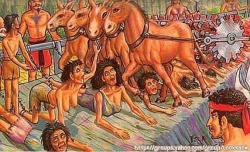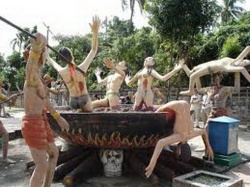Avici
In Buddhism, Avīci (Sanskrit and Pali: "without waves"; also transliterated Avichi, Japanese and Chinese language: 無間地獄, mugen jigoku and 阿鼻地獄, Abi jigoku) is the lowest Level of the Naraka or "hell" realm, into which the dead who have committed grave misdeeds may be reborn. It is said to be a cube 20,000 yojanas (120,000 to 300,000 km) to a side, buried deep underneath the earth.[1] Avici is often translated into English as the "Non-returning" Hell, due to the idea that those beings which have been sent there languish there eternally. The other Hells function more like Purgatory, where after perhaps a few eons of suffering, the being might be reborn as some sort of lowly life-form in a somewhat less horrible place; but, the beings in Avici Hell are thought to be hopeless for any respite.
Avici-meriting sins
There are various evil acts which can lead one to be committed to the eternal torments of the Avici Hell. People reborn in Avīci generally have committed one or more of the Five Grave Offenses:
- Intentionally murdering one's father
- Intentionally murdering one's mother
- Killing an Arhat (enlightened being)
- Shedding the blood of a Buddha
- Creating a schism within the Sangha, the community of Buddhist monks and nuns.
Eternity in Hell
Buddhism teaches that rebirth into Naraka is temporary, while the offending being works off the karma they performed. According to some[who?], rebirth into Avīci hell is not eternal. However, suffering in Avīci is the longest of all the Levels of hell, by some accounts over 1018 years long[citation needed]. Some sutras state that rebirth in Avīci will be for innumerable kalpas (eons). When the offending being passes away after one kalpa, he is again reborn in the same place, undergoing suffering for another kalpa, and on and on until he has exhausted his bad karma.[2] For this reason, Avīci hell is also known as the "non-stop way" (無間道).
Soka Gakkai version
Nichiren famously wrote that Buddhist monks who ignored the passages in the Lotus Sutra, which claimed its superiority over other sutras would fall into the Avīci hell.[3] Outside of Nichiren, it is extremely rare for a Buddhist monk to condemn anyone to Avīci hell. Although the Lotus Sutra itself states "when his [those who slander) life comes to an end, he will enter the Avichi Hell."
Rebirth in Avīci (or any lower realm for that matter) should be seen as a process of purification rather than a form of punishment as there is no supernatural being that determines anyone's fate of its own will[4] and everyone is responsible for their own actions and their consequences: "[...]beings are owners of kamma, heir to kamma, born of kamma, related through kamma, and have kamma as their arbitrator. Kamma is what creates distinctions among beings in terms of coarseness & refinement."[5] Thus, being reborn in Avīci is purely the inevitable result of one's evil deeds and not the decision of, for example, a malevolent deity.

